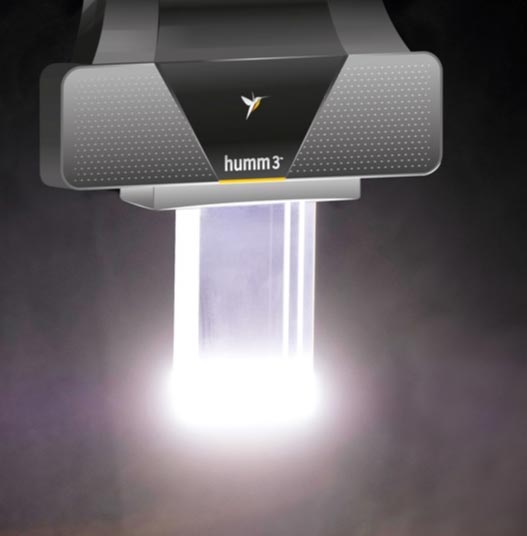Breakthrough technology from Heraeus Noblelight for aerospace

The humm3® has proved itself to be an excellent heating technology for fast and controllable dry fibre lay-up. Copyright Heraeus
humm3 technology is at the heart of the test facility at DLR in Stade, Germany. Since 2017 research has been ongoing with new composite materials for space and aircraft structures.
The aim of the collaboration between Heraeus Noblelight and DLR is, to establish a powerful, controllable and safe heat source for industrial manufacturing processes of composite materials such as Automated Tape Laying (ATL) and Automated Fibre Placement (AFP).
Humm3 optimizes industrial manufacturing of composite materials
The results of trials show the high level of control over a wide range of temperatures that can be achieved using humm3®. The suitability of humm3® in terms of performance and safety for large-scale industrial integration has been proved.
The Xenon technology has been developed by Heraeus Noblelight (Cambridge, UK) and branded humm3® heating technology is compact, scalable and controllable.
The main advantages are: rapid uniform heating, equivalent to a laser; a high levels of control; scalable heating zone sizes, from narrow to 300mm and beyond; and enhanced safety which makes enclosing the layup process unnecessary.
Heraeus Noblelight is exhibiting in the UK pavilion at JEC Paris (Hall 6A Booth S50), please visit us to find out more about our humm3 technology. DLR are also exhibiting at JEC Paris (Hall 5A Booth E67) where there will be a humm3 head module on display.
Further details can be found here:
www.heraeus-noblelight.com/humm3
https://www.youtube.com/watch?v=mqS5rglGh9U
https://event.dlr.de/en/jec2019/humm3-xenon-flashlamp/
A globally leading technology group, Heraeus is headquartered in Hanau, Germany. Founded in 1851, it is a family-owned portfolio company which traces its roots back to a pharmacy opened by the family in 1660. Today, Heraeus combines businessesin the environmental, energy, electronics, health, mobility and industrial applications sectors.
In the 2017 financial year, Heraeus generated revenues of €21.8 billion. With approximately 13.000 employees in 40 countries, the FORTUNE Global 500-listed company holds a leading position in its global markets. Heraeus is one of the top 10 family-owned companies in Germany.
With technical expertise, a commitment to excellence, a focus on innovation and entrepreneurial leadership, we are constantly striving to improve our performance. We create high-quality solutions for our clients and strengthen their long-term competitiveness by combining unique material expertise with leadership in technology.
Heraeus Noblelight GmbH with its headquarters in Hanau and with subsidiaries in the USA, Great Britain, France and China is one of the technology- and market-leaders in the production of specialty light sources and systems. In 2017, Heraeus Noblelight employed 762 people worldwide. The organization develops, manufactures and markets infrared and ultraviolet emitters, systems and solutions for applications in industrial manufacture, environmental protection, medicine and cosmetics, research, development and analytical measurement techniques..
For further information, please contact:
Technical: Heraeus Noblelight Ltd.
Cambridge Science Park
Cambridge CB4 0FQ
Phone +44 1223 423324, Fax +44 1223 423999
hnl-laserlamps@heraeus.com
www.heraeus-noblelight.com/arcflash
Press: Ross Kitson
Heraeus Noblelight Ltd.
Ross.kitson@heraeus.com
Media Contact
More Information:
http://www.heraeus.comAll latest news from the category: Trade Fair News
Newest articles

NASA: Mystery of life’s handedness deepens
The mystery of why life uses molecules with specific orientations has deepened with a NASA-funded discovery that RNA — a key molecule thought to have potentially held the instructions for…

What are the effects of historic lithium mining on water quality?
Study reveals low levels of common contaminants but high levels of other elements in waters associated with an abandoned lithium mine. Lithium ore and mining waste from a historic lithium…

Quantum-inspired design boosts efficiency of heat-to-electricity conversion
Rice engineers take unconventional route to improving thermophotovoltaic systems. Researchers at Rice University have found a new way to improve a key element of thermophotovoltaic (TPV) systems, which convert heat…



